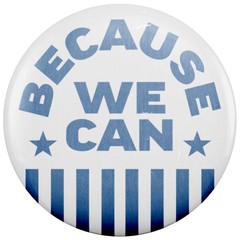Because We Can is an ongoing series about making politics a practice, even when there isn’t a national election looming.
Connect with an organization that’s excited to support someone like you.
No campaign happens in a vacuum—and if you’re mulling the idea of running for something, there are plenty of progressive electoral organizations out there specifically looking to work with non-traditional candidates. Take Bet On Us, a project for Black women, non-binary individuals, and LGBTQ candidates that Whaley spearheaded through the WFP in the southeastern U.S. “We invest in our people to make sure they’re equipped—a lot of our political jargon is inaccessible to the layperson,” Whaley said. “We're building the political home that centers the voices and the leadership of people of color, queer communities, folks who hold marginalized identities.” Stephanie Taylor, one of the co-founders of the Progressive Change Campaign Committee, said that one of the main goals of her organization is to empower candidates from outside the political mainstream. “We believe very much that vulnerabilities can be a source of strength in a campaign,” Taylor told VICE. “We very much try to push folks to understand their vulnerabilities, and then also think about how those vulnerabilities reveal more about themselves as a person and as a candidate, and in terms of what drives them.” A little research and a few emails can go a long way here—look for groups with chapters in your area or shoot out a query to an organization’s central website to get connected. Those groups can help you assess costs, sharpen your PR and comms skills, and provide an energized volunteer force of phone bankers (and canvassers, when we’re allowed to talk to each other IRL again).But it’s especially important, Whaley said, to work with people who want to work with you—not just someone who ticks a set of boxes. “Bring yourself into this process, because that's actually what we need,” she said. “We need varying perspectives and life experiences that will inform a better policy making process.”Start treating your past organizing efforts as the work experience that they are.
Did you rally the residents in your apartment building to form a tenants union? Have you fought for resources like shelter, winter clothing, food, and internet access for your unhoused neighbors? Have you become a key player in your neighborhood’s mutual aid network? Are you fighting for better conditions for students and teachers at your child’s school? Clogging your city councilmember’s answering machine to get stop signs for a dangerous intersection? If so, congratulations: You’ve led organizing work that helps make your community a better place to live. If you’d like to take that leadership to another level, according to Whaley, you’re in a perfect position to do so. “Most of the time, you see folks who are already leaders in their communities, and because they don't fit what people consider the prototype of an elected leader, or a leader in general, they will shy away or not explore that option of running for office,” she said. “My goal is to capture those folks, and really start to go through the process of redefining how we think of our leaders.” According to Whaley, changing your own definition of what leadership looks like can be the first step to changing society’s preconceived notions about it—which, in turn, empowers more people to claim the accomplishments they’ve already achieved and take them to the next level, too.If you don’t have organizing experience, ask yourself: Why not? If you’re less interested in collective action and investing in your community than, say, having your face on campaign flyers or talking to your local publications, politics might not be for you. If you’re just new to the neighborhood or political consciousness in general, plug in with local organizers to gauge what your community actually needs before shooting for the moon with electoral politics. If you simply haven’t had time to engage with community organizing before because you’re chained to a soul-sucking, minimum wage job (or three!), Aaron Taube of the Democratic Socialists of America (full disclosure, I’m also involved with the New York City chapter of the organization) told VICE that kind of experience matters too. “The overwhelming majority of voters have to work for a living and being a worker is a shared condition of life,” Taube, whose electoral experience includes working on Rep. Alexandria Ocasio-Cortez’s 2018 campaign, said. “Having that experience of being a working-class person is really relevant to the voting electorate. Take Cori Bush, a former nurse—the way that she spoke about what's happening in the Capitol, where Republicans are evading these metal detectors and just walking into the Senate Chamber with guns. On MSNBC, she was like, ‘Look, have these people ever had a job? If you have a job in McDonald's, if you don't come into work with your uniform, you don't work.’ That's something that resonates with everyone who has to come to a workplace every day."Discuss your “baggage” upfront.
When you consider running for office, think about what’s stopping you and be honest with yourself about how personal attacks could make you feel. If you have skeletons in your closet, accept that you’re running in the same world as Twitter Advanced Search, the Wayback Machine, and Heavy.com, and prepare for the fact that they will be unearthed. Whaley said the WFP helps the candidates they support work through things in their past by walking them through how an incident they consider damning—lapsed loan payments, an arrest record, calling the cops on an abusive partner—connects to the kind of bigger picture problems they’d be fighting against in office. “When we sit down with candidates, we say, ‘What's the worst headline that's written about you? This is a safe space, so you should assume that, whatever that is, it could come up and come out, and we should talk about what that means,’” Whaley said. “A lot of times, what we'll see is that we can connect that [worst headline] back to the story of everyday working people. It’s important for us, in particular when working with non-traditional candidates, to help them to see that and, quite frankly, to remove shame.”Taylor agreed that kind of reflection is critical—and added that it can even make your campaign stronger. “Let's say you’re a candidate, and you have a long history of speeding tickets,” Taylor said. “What's the story behind those tickets? Is there a story about the single mom working three jobs having to rush to pick up your kids before daycare closed and you kept getting speeding tickets? Get that story out first, because that's a story that working people can relate to, which means it's an asset. That story of being a struggling, rushed, working mom should be the central narrative of your campaign.” Giving context to the aspects of your story that are “shameful” can go a long way toward showing the people you want to represent that you can connect with their concerns—and with them!—because you’ve literally been there before, and you know how shitty it feels to struggle.“One example I thought was really powerful is from the Stacey Abrams race in 2018,” Whaley said. When opponents dredged up the fact that Abrams had hundreds of thousands of dollars of debt, she explained that she’d accrued that debt from attending expensive, elite institutions without financial assistance from her family, and then from assisting her family with expenses later in life, like helping her parents care for their grandchildren. “The way she broke it down was so powerful, because I could see my story in that, as a first generation college student, I could see my story in that as someone who has aging parents,” Whaley said. “I could see having to decide, ‘Oh, am I going to pay the IRS or am I going to help my mom feed my niece and nephew?’”Know your audience, and think about how you, personally, might appeal to them.
Context is also crucial when it comes to explaining political beliefs that are still fairly radical by current standards. According to Taube, who works with the Queens branch of the New York City DSA chapter, location has been a big part of what has made his electoral experience so successful. He said the district a candidate is running in has a deep impact on how they’re received by voters. “I'm very fortunate to do this work in New York City, particularly western Queens where I live, because there was a progressive strain here even before the wave of DSA candidates and Justice Democrats started to win elections,” Taube said. “Our comrades in Austin DSA probably have a different experience of running candidates as socialists than we do here in Queens.”But regardless of geography, Taube said that part of the training DSA gives candidates involves helping them craft an explanation for what being a socialist means to them that allows them to connect with voters who’d typically balk at the label. “If you explain it in moral terms, I think that it resonates with people,” he said. “Alexandria, when she was first running, it said something like, ‘democratic socialism means that in a modern, moral society, no one should be too poor to live.’ And most people agree with that, right?”Remember: Most people aren’t the “stereotypical candidate” either.
It’s important to keep in mind that not only is nobody perfect—almost nobody fits the mold of the “perfect candidate,” either. (Not to mention the fact that so many white men with the politician pedigree turn out to be unqualified freaks anyway!) That means that they’re probably more likely to see themselves, or someone they love and respect, in a candidate who falls outside of the prototypical politician than someone who fits squarely into it. Don’t believe us? Ask AOC, Cori Bush, Danica Roem, Jamaal Bowman, Rashida Talib, Ilhan Omar, Ayanna Pressley, Mondaire Jones, Ritchie Torres, Nikil Saval, Katie Porter, Tammy Duckworth, Jabari Brisport, Nithya Raman, Aja Brown—the more barrier-breaking, passionate, genuinely inspiring people who are willing to run for office, the more normal it gets to not be… “normal,” and the easier it becomes for others to follow.Basically, if you wish there were more people like you in office, then it’s worth taking the plunge and love things like taking notes and sitting on committee, doing the slow work necessary to make change for the better, then it’s worth taking the plunge. That’s doubly true if you have the chance to break barriers for future leaders, and to give your community the opportunity to be part of that process. “Beyond sort of the representational thing, I think it's exciting to do something that is historic, and fresh and new,” Taube said of Ocasio-Cortez’s campaign. “We would tell people during Get Out the Vote, ‘Are you ready to make history today?’ And they did. They voted and they made history.”Follow Katie Way on Twitter.
